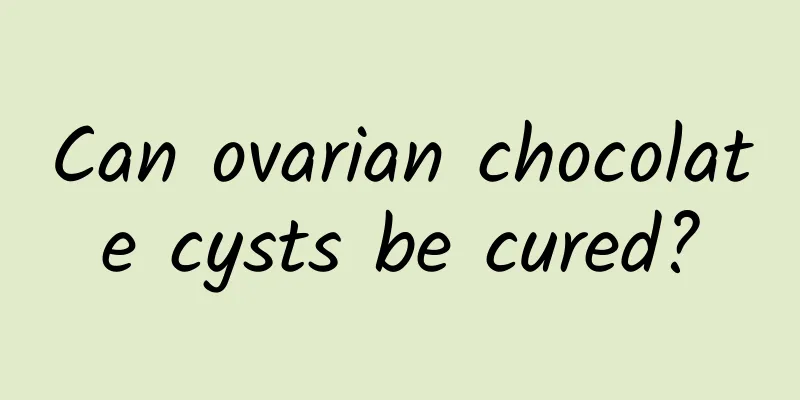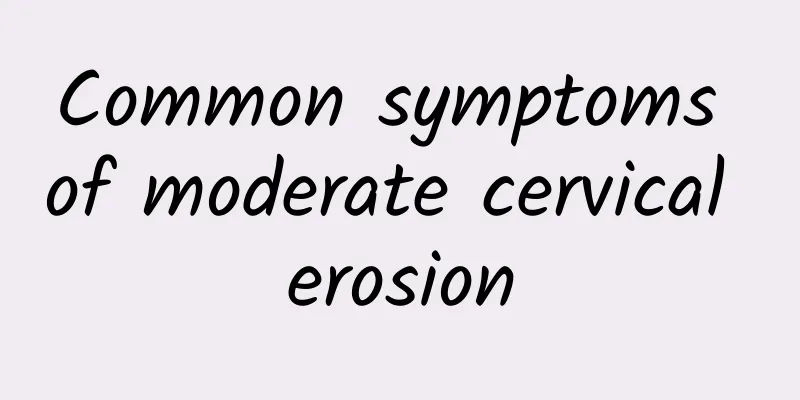Is uterine cyst serious? Is there any danger? Will it get worse?

|
Uterine cysts are benign in most cases, but if they are large or infected or ruptured, they may cause serious problems and require early medical evaluation. Its hazards include menstrual abnormalities, risk of infertility and the possibility of malignant lesions. Treatment methods include medication, surgery and lifestyle adjustments. 1 Common causes of uterine cysts The formation of uterine cysts is related to many factors, specifically: Genetic factors: If there is a family history of polycystic ovaries or other gynecological problems, the risk may be increased. Environmental factors: Excessive estrogen exposure such as estrogen-mimicking chemicals in the environment, an unhealthy diet, or chronic stress may trigger cyst growth. Physiological factors: Hormonal fluctuations during the menstrual cycle, ovarian dysfunction, and inflammation of the female reproductive organs can all lead to cyst formation. Pathological cysts: Diseases such as adenomyoma, PCOS and ovarian cyst syndrome may induce uterine cysts or even aggravate the condition if they are not effectively treated. 2Specific hazards of uterine cysts Menstrual irregularities and pain: Cysts can compress the uterus or nearby organs, leading to irregular periods, heavy bleeding, or lower abdominal pain. Increased risk of infertility or miscarriage: Larger cysts may affect the development of follicles or the implantation of fertilized eggs. Risk of cyst deterioration: Although most cysts are benign, a small number of cysts, such as some complex cysts, may gradually develop into malignant ones and require close monitoring. 3 How to treat uterine cysts Drug regulation: Taking estrogen and progesterone to regulate hormone balance, such as oral contraceptives. Patients with polycystic ovary syndrome can use metformin to improve ovarian metabolic function. Minimally invasive surgery: If the cyst is large and recurs repeatedly, the cyst can be removed through laparoscopic surgery to avoid compression of other organs. Adjustments to diet and lifestyle: Reduce the intake of high-sugar and high-fat foods and increase the intake of fruits and vegetables rich in fiber; quit smoking and drinking and pay attention to a regular schedule to help improve the body's ability to regulate hormones. Although uterine cysts are less harmful in most cases, they may affect women's health and even pose a risk of malignancy in severe cases, so they should be taken seriously. Once abnormal menstrual flow, increased abdominal pain or other related symptoms occur, you should consult a doctor as soon as possible to clarify your condition and take targeted treatment. Developing the habit of regular physical examinations can effectively prevent and monitor the occurrence and development of cysts. |
<<: Can uterine cysts be eliminated by taking medicine? Will they recur?
>>: Will cervical pregnancy lead to spontaneous abortion? Will there be bleeding?
Recommend
Eating mushrooms is very tasty! Increase satiety without eating fat
In summer, girls who want to have slim figures do...
I have gout and can’t eat beans? Control uric acid first, no need to worry about imperial disease
If you have gout, you can’t eat beans? Doctors po...
What can you eat to make uterine fibroids smaller? Eat 4 more foods to eliminate uterine fibroids
What can you eat to make uterine fibroids smaller...
Women with qi and blood imbalance are more likely to develop ovarian cysts
How to treat ovarian cysts? Disorders of Qi, bloo...
Will endometrial polyps disappear with menstruation?
Will endometrial polyps disappear with menstruati...
What medicine should Gongyanping be used with to treat uterine fibroids? Can Gongyanping reduce inflammation?
What medicine should Gongyanping be used with to ...
With the examination of cervical hypertrophy, the patient's condition can be discovered in time
At present, with the increasing number of patient...
Dangerous manifestations of severe cervical erosion in women
Cervical erosion is a very common gynecological i...
Can I use my phone after having an abortion?
You can watch your phone after an abortion, but n...
Joanne Tseng’s 6 dietary principles! Adhere to intermittent fasting + professional fitness coach to maintain a confident and perfect body
"I don't lose weight. Talking about losi...
What causes adnexitis?
Adnexitis is mainly caused by bacterial infection...
How much does it cost to cure endometrial thickening?
How much does it cost to cure endometrial thicken...
Bacterial vaginosis is dangerous during pregnancy
Due to the huge harm caused by bacterial vaginiti...
Experts explain important treatment considerations for chronic adnexitis
Chronic adnexitis is a gynecological disease that...
The harm that hyperprolactinemia can cause to the body
What harm does hyperprolactinemia bring to the bo...









